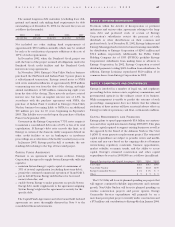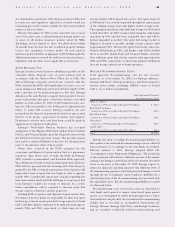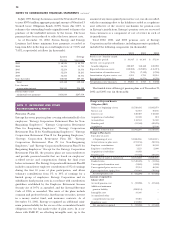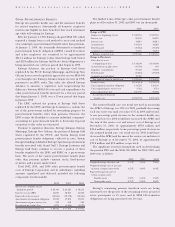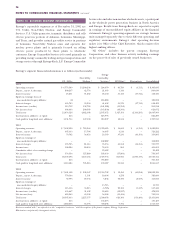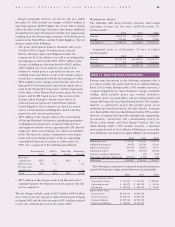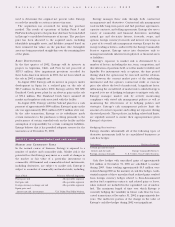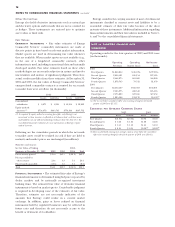Entergy 2002 Annual Report Download - page 79
Download and view the complete annual report
Please find page 79 of the 2002 Entergy annual report below. You can navigate through the pages in the report by either clicking on the pages listed below, or by using the keyword search tool below to find specific information within the annual report.
ENTERGY CORPORATION AND SUBSIDIARIES 2002 77
used to determine the original net present value. Entergy
records the monthly accretion as interest income.
The acquisition was accounted for using the purchase
method. The results of operations of Indian Point 3 and
FitzPatrick subsequent to the purchase date have been included
in Entergy’s consolidated statements of income. The purchase
price has been allocated to the acquired assets, including
identifiable intangible assets, and liabilities assumed based on
their estimated fair values on the purchase date. Intangible
assets are being amortized straight-line over the remaining lives
of the plants.
ASSET DISPOSITIONS
In the first quarter of 2002, Entergy sold its interests in
projects in Argentina, Chile, and Peru for net proceeds of
$135.5 million. After impairment provisions recorded for
these Latin American interests in 2001, the net loss realized on
the sale in 2002 is insignificant.
In August 2002, Entergy sold its interest in projects under
development in Spain for a realized gain on the sale of
$25.7 million. In December 2002, Entergy sold its 800 MW
Damhead Creek power plant for an after-tax gain on the sale
of $31.4 million. The Damhead Creek buyer assumed all
market and regulatory risks associated with the facility.
In August 2001, Entergy sold the Saltend plant for a cash
payment of approximately $800 million. Entergy’s gain on the
sale was approximately $88.1 million ($57.2 million after tax).
In the sales transaction, Entergy or its subsidiaries made
certain warranties to the purchasers relating primarily to the
performance of certain remedial work on the facility and the
assumption of responsibility for certain contingent liabilities.
Entergy believes that it has provided adequate reserves for the
warranties as of December 31, 2002.
NOTE 15. RISK MANAGEMENT AND FAIR VALUES
MARKET AND COMMODITY RISKS
In the normal course of business, Entergy is exposed to a
number of market and commodity risks. Market risk is the
potential loss that Entergy may incur as a result of changes in
the market or fair value of a particular instrument or
commodity. All financial and commodity-related instruments,
including derivatives, are subject to market risk. Entergy is
subject to a number of commodity and market risks, including:
Type of Risk Primary Affected Segments
Power price risk All reportable segments
Fuel price risk All reportable segments
Foreign currency exchange rate risk All reportable segments
Equity price and
interest rate risk - investments U.S. Utility, Non-Utility Nuclear
Entergy manages these risks through both contractual
arrangements and derivatives. Contractual risk management
tools include long-term power and fuel purchase agreements,
capacity contracts, and tolling agreements. Entergy also uses a
variety of commodity and financial derivatives, including
natural gas and electricity futures, forwards, swaps, and
options, foreign currency forwards, and interest rate swaps as
a part of its overall risk management strategy. Except for the
energy trading activities conducted by the Energy Commodity
Services segment, Entergy enters into derivatives only to
manage natural risks inherent in its physical or financial assets
or liabilities.
Entergy’s exposure to market risk is determined by a
number of factors, including the size, term, composition, and
diversification of positions held, as well as market volatility and
liquidity. For instruments such as options, the time period
during which the option may be exercised and the relation-
ship between the current market price of the underlying
instrument and the option’s contractual strike or exercise
price also affects the level of market risk. A significant factor
influencing the overall level of market risk to which Entergy is
exposed is its use of hedging techniques to mitigate such risk.
Entergy manages market risk by actively monitoring
compliance with stated risk management policies as well as
monitoring the effectiveness of its hedging policies and
strategies. Entergy’s risk management policies limit the
amount of total net exposure and rolling net exposure during
the stated periods. These policies, including related risk limits,
are regularly assessed to ensure their appropriateness given
Entergy’s objectives.
Hedging Derivatives
Entergy classifies substantially all of the following types of
derivative instruments held by its consolidated businesses as
cash flow hedges:
Instrument Business Segment
Natural gas and electricity
futures and forwards Energy Commodity Services
Foreign currency forwards U.S. Utility, Non-Utility Nuclear
Cash flow hedges with unrealized gains of approximately
$21 million at December 31, 2002 are scheduled to mature
during 2003. Gains totaling approximately $4.3 million were
realized during 2002 on the maturity of cash flow hedges. A sub-
stantial majority of these unrealized and realized gains resulted
from foreign currency hedges related to Euro-denominated
nuclear fuel acquisition contracts, and related gains or losses,
when realized, are included in the capitalized cost of nuclear
fuel. The maximum length of time over which Entergy is
currently hedging the variability in future cash flows for fore-
casted transactions at December 31, 2002 is approximately five
years. The ineffective portion of the change in the value of
Entergy’s cash flow hedges during 2002 was insignificant.


